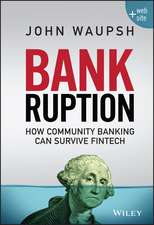Creating the Future with All Finance and Financial Conglomerates
Autor L. van den Berghe, K. Verweireen Limba Engleză Hardback – 31 iul 1998
The structure of the book is logical: starting on theoretical foundations (section 1, part A) and examining the economic value of All Finance and Financial Conglomerates (part B), leads to creating a concept for the future (part C). Case studies add additional practical value to this research. The review of the subject is completed by aspects of risk management in this sector and by political guidelines for the EU single market (section 2).
The book builds further on Professor Van den Berghe's first publication, entitled Financial Conglomerates - New Rules for New Players (published by Kluwer Academic Publishers in October 1995) and broadens the scope in the direction of strategic and managerial aspects. The following five aspects underline the innovativeness of the material:
- The volume is not only focused on the diversification of banks via `bancassurance', but also analyses in depth the parallel developments in the insurance market, whereby insurers and insurance intermediaries launch themselves in the direction of `assurfinance';
- The material analyses not only the cross-selling of each other's products and the blurring of the market boundaries, but also the diversification, collaboration, and integration on all other levels and functions;
- New conceptual tools (the financial conglomerates control board) are developed toprovide a more in-depth comparison of the many cases of this international trend;
- The book goes far beyond the categorisation of the mode of diversification, by looking at all managerial aspects of such a growth strategy; and
- The work looks at the economic and legal aspects involved as well as at the more strategic and managerial aspects.
This research has been made possible thanks to the financial support of The LEVOB Foundation.
| Toate formatele și edițiile | Preț | Express |
|---|---|---|
| Paperback (1) | 637.46 lei 6-8 săpt. | |
| Springer Us – 29 oct 2010 | 637.46 lei 6-8 săpt. | |
| Hardback (1) | 643.84 lei 6-8 săpt. | |
| Springer Us – 31 iul 1998 | 643.84 lei 6-8 săpt. |
Preț: 643.84 lei
Preț vechi: 757.46 lei
-15% Nou
Puncte Express: 966
Preț estimativ în valută:
123.24€ • 133.91$ • 103.59£
123.24€ • 133.91$ • 103.59£
Carte tipărită la comandă
Livrare economică 21 aprilie-05 mai
Preluare comenzi: 021 569.72.76
Specificații
ISBN-13: 9780792381839
ISBN-10: 0792381831
Pagini: 223
Ilustrații: XII, 223 p.
Dimensiuni: 156 x 234 x 14 mm
Greutate: 0.51 kg
Ediția:1998
Editura: Springer Us
Colecția Springer
Locul publicării:New York, NY, United States
ISBN-10: 0792381831
Pagini: 223
Ilustrații: XII, 223 p.
Dimensiuni: 156 x 234 x 14 mm
Greutate: 0.51 kg
Ediția:1998
Editura: Springer Us
Colecția Springer
Locul publicării:New York, NY, United States
Public țintă
ResearchCuprins
Content.- 1. Setting the scenery.- 2. From bancassurance and assurfinance towards all finance — the concepts of unbundling and rebundling.- 3 Looking for the ratio behind the diversification strategies.- 4. The financial conglomerates control board.- 5. Comparative analysis of diversification strategies with the help of the financial conglomerates control board.- 6. Research into the overall effect of the diversification strategies in the financial services industry.- 7. The basic concept of creating the future: what strategic concepts and insights are useful or even necessary?.- 8. Case studies of stretch and leverage.- 9. Managing the risks involved: regulatory issues and solutions.- 10. Managing the risks involved: regulatory issues and solutions.- 11. Synthesis and conclusions.- References.
Recenzii
`...this is an interesting and informative book. It approaches this complex topic from an academic perspective rather than presenting a passionate viewpoint from someone inside either sector, and it suggests the F.C.C.B. as a helpful analytic tool. The book also contains some interesting observations about the financial services sector that many not always readily come to mind.'
The Journal of Risk and Insurance, March 2001
The Journal of Risk and Insurance, March 2001
















